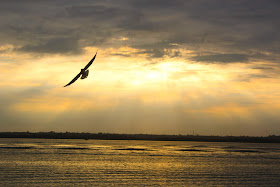Do you find
yourself living in the past? More likely, considering the current situation
with COVID-19 restrictions, you find yourself living in the future: What will
happen? And when? If living in the past brings with it either rosy and rather
skewed memories, or bitterness and regret, living in the future means focusing
on the unknown. And that can bring with it an overwhelming sense of anxiety:
especially when the security of our ‘now’ is threatened.
My 2019 Advent
book, Humbug and Happiness, is based on the 1951 film Scrooge (released
in the US as A Christmas Carol), the Christmas classic based on Charles
Dickens’ famous novel. The story is, of course, about the miserly and miserable
Ebenezer Scrooge, who lives a poor life, for all his riches. We see how his
past has affected his ‘now’, and what might happen if he continues to live in
this selfish and wholly self-centred way. But Scrooge has a chance to change.
He can be different, and so bring about a different future for himself and
others. Just as the past has brought him to where he is now, the future narrative
is fluid. How he reacts today will change tomorrow.
Sometimes our
reactions can surprise us. Perhaps these early days of the COVID-19 virus are
revealing just where our faith truly rests. It’s a shaking up of everything we
knew, and trusted in. Uncertainty reigns. But we need to ‘be still’, as Psalm
46 urges us, and to remember who is ultimately in charge.
I tend to live
as if I’m in control. Yes, I love Jesus, but the complete, forced change of
life is making me realise how much ‘I’ am still on the throne of my life. I
can’t do what I would normally do. I can’t go where I’d usually go. Living on
my own, I miss company.
But then – I’m
not really on my own, am I? God is here. He has promised never to leave or
forsake me (Hebrews 13:5). He says he is my provider (Genesis 22:14). If the
Lord is never going to abandon and desert me, then why do I fear? What am I
still relying on – surely I should rely on God alone?
I’ve had
wilderness times in my life, and periods of isolation; so have many people, through
illness, disability, or other reasons. When I was in my thirties I had Ménière’s
disease, which meant I also suffered from life-limiting agoraphobia; I couldn’t
go anywhere or do anything much for years. And yet during that time I met with
God in such a deep way that it was as if I could turn around and see Jesus
standing at my side. I walked with him closely; I knew his voice. He was my
constant companion. And he never let me down. Indeed, he did amazing and
unexpected things in my life.
Truthfully,
when my health improved, I found myself relying more and more on ‘me’. It
happened gradually. God was still there and I spent time with him. But until
this current period of real turmoil and chaos, I didn’t realise how far I’d
moved from the total dependence on God that I experienced when I was younger –
when he was my complete security, not the ‘things’ that have since crept in.
My past – the
years of infirmity – certainly affected my ‘now’, in that my faith is in a God
I know can be trusted, and who can do more than I ever imagine (Ephesians
3:20). But it’s as if I, like the lost sheep, have wandered off … I don’t pay
as much attention to the daily promptings of my heavenly Shepherd as I once
did.
So COVID-19 is
a wake-up call for me personally. God is there, and when I observe the
barefaced fear of the people around me in the shops, the panic-buying and
tight-lipped terror, I realise that I need to get back to my first love; to
spend more time with God, listening to his voice, relying on him, and therefore
able to share the hope that I have with a world of people who have built their
lives on sinking sand. Indeed, maybe part of my own life has veered into
that very sand. I feel the anxiety of an unknown tomorrow; and yet I know the
One who knows all things – including what will happen next week, next month,
next year – and urges me to trust in him, to have peace, and not to be afraid.
Using this time
of enforced solitude and restriction may well bring about more hope and faith
in the One who is hope; the only One we can ultimately ever trust in. We
are finite beings who live as if we will be here forever. But that isn’t so. If
we know Jesus, our home isn’t here at all; it’s with him, in a place that is
unchanging.
This is a time
when faith will be tested; a time when we have the opportunity to really know
God to be true, all-powerful, yet merciful and forgiving. It’s a time when we
can draw near to the One who is God, our gentle Shepherd, who calls our name. I
think how I – how you – respond to him during this time will impact the future
enormously, both personally and in other, far-reaching ways. As our freedoms
are taken away, we may well discover a new kind of freedom: an inner freedom.
Paul, in his prison cell, points out in Philippians 1, how his chains have
served a greater purpose: to ‘advance the gospel’ (verse 12, NIV UK 2011). Dare
we believe that, somehow, the present crisis might lead to a closer walk with
God, and hope in an unchanging certainty in Christ for many others?
***
Each day, we
will post a short article by one of Darton, Longman and Todd’s amazing authors,
offering a personal reflection on our current situation in life. Sometimes this
will be written with reference to one of their books, and sometimes about how
they are living in response to the coronavirus and our current world situation.
We hope it will give you a taste of the depth and diversity of DLT’s list –
books for heart, mind and soul that aim to meet the needs and interests of all.


No comments:
Post a Comment